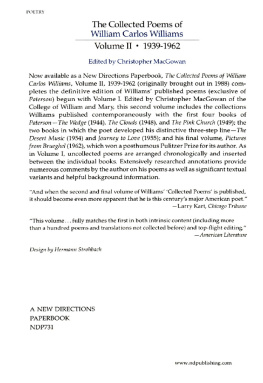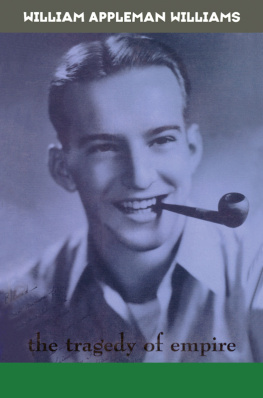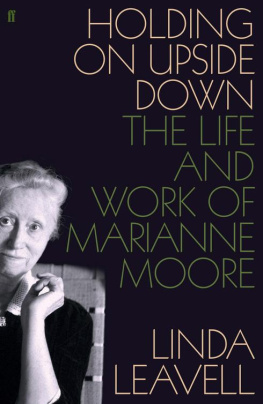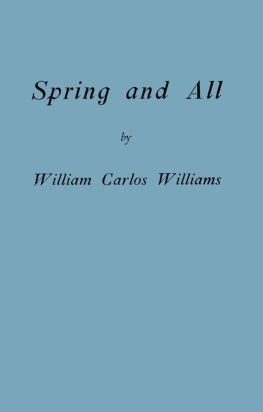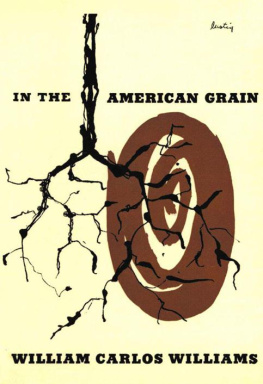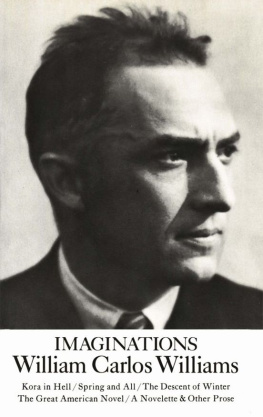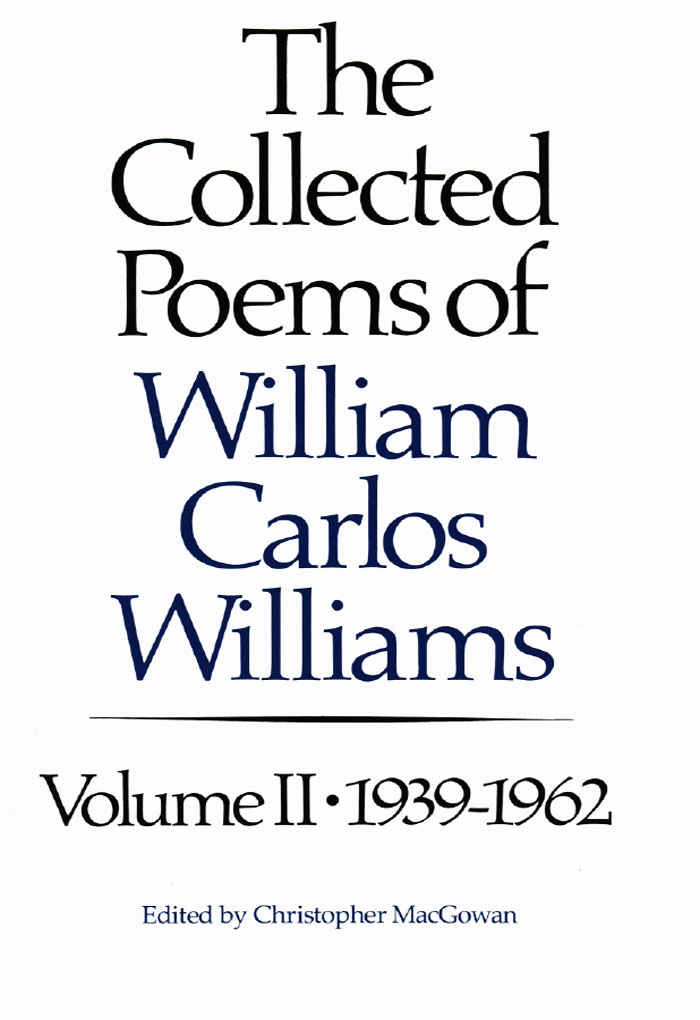The
Collected
Poems of
William
Carlos
Williams
Volume II
1939-1962
Preface
This volume is the second of a two-volume edition collecting all of William Carlos Williams published poetry with the exception of his long poem
Paterson (which will be edited as a separate volume). Volume II covers the years from 1939 to 1962when the cumulative effect of a series of strokes forced Williams to stop writing in the months before his death in March 1963. Continuing the aim of presenting Williams development and achievement in as clear a way as possible, this volume follows Volume I in rejecting Williams own arrangement of his collected poemsin this case his
Collected Later Poems of 1950. Instead, the poems Williams published in individual volumes are printed in their original order in those volumes, while poems that remained uncollected or were only collected in the 1950 collection are printed chronologically according to date of first publication. The poems first published in
Collected Later Poems appear in their chronological place in 1950. Volume II begins with uncollected poems from the years 1939-1944, and concludes with the Pulitzer prize-winning
Pictures from Brueghel (1962).
Williams organized The Collected Later Poems around a framework somewhat more chronological than the thematic arrangement of Collected Earlier Poems, although the sections representing The Wedge (1944) and The Clouds (1948) do not exactly correspond to the poems in those two volumes. However, Williams design for the volume was frustrated by his overlooking a number of his 1940s poems (some found their way into The Collected Earlier Poems), and particularly by his failing to catch the absence of a section containing ten poems that had been mislaid by his typist. The section was hastily added to the back of the book in the middle of the print run. The later printing history of the book further obscured his original intentions. In a 1963 revision John Thirlwall added a further section, The Lost Poems (1944-1950), and in 1972 New Directions tacked a poem written in 1960, Tribute to Neruda, the Poet Collector of Seashells, onto the end of this section. Those readers interested in Williams arrangement of Collected Later Poems, and a list of the later additions, will find a table of contents in Appendix C.
The opening poems of Volume II reflect Williams continuing uncertainty and experimentation as he sought a solution to the stylistic and thematic problems raised by his plans for Paterson. Many of these poems are included in the various pre-Paterson typescripts Williams arranged and rearranged from the middle 1930s to the early years of the next decade, and that are now deposited at Harvard and Buffalo. In sending the first of these, the eighty-seven page Detail & Parody for the poem Paterson typescript, to New Directions in 1939 Williams indicated something of the scope of his ambitions. They are not, he wrote of the poems in some ways, like anything I have written before but rather plainer, simpler, more crudely cut. Look em over. I too have to escape from my own modes. I offer them as one mans digression from the early or recent work of WCW.
A 1941 sequence of poems in The Broken Span titled For the Poem Paterson, is the only extended arrangement of these poems Williams chose to publish. Not until the opening poems of The Wedge (1944), does Williams articulate what came to be the workable strategy for his long poem. A unifying feature of Williams concerns in the 1950s is his interest in the American idiom and the variable foot, but the decade also saw him respond in two different ways to two very different challenges, and produce two very different kinds of poetry. In 1951 and 1952 Williams suffered two strokes, and these were followed by a severe depression that eventually demanded hospitalization. The triadic-line poems of the first half of the 1950s record both the tragedy and the determined response. Pictures from Brueghel collects most of the poems that grew out of this final demand. Pictures from Brueghel collects most of the poems that grew out of this final demand.
A number of further strokes took their toll, and Williams told John Thirlwall at the end of 1961 that he had given up writing, although a number of poems in various states of completion were found among the poets papers after his death. I have published the uncollected, posthumously published poems by date of composition, concluding the final uncollected section with Stormy, the poem that Paul Mariani records was the last poem Floss was sure her husband had written. Other departures from the practice of publishing uncollected poems by date of publication are documented in Appendix A. A distinguishing feature of this volume is the large number of uncollected translations that Williams made in the second half of his career, often during periods of uncertainty about the direction of his own work. The translations are from languages he knew wellFrench and Spanishand from those he knew barely or not at allGreek and Chinese. Translating contemporary writers, as he told Nicolas Calas in 1940 and David Ignatow in 1949, could help him in the struggle with problems of form, while translation from the classics, he reminded Cid Corman in 1955, demanded lively invention in order to demonstrate how present modes differ from the past by showing what in the present is equivalent, not the same, with what existed then.
A detailed description of the editorial procedures for this volume may be found in Appendix A, A Note on the Text. The reader should keep these general principles in mind: (1) Although the poems are printed within the context of the original volumes in which they appeared, or in order of first publication, a corrected text of Collected Earlier Poems and Collected Later Poems is used for the poems that appeared in those volumes. The poems not included in those two collections, or in Pictures from Brueghel (which reprinted The Desert Music and Journey to Love) are printed in their original published forms, and are identified in the Annotations (Appendix B). (2) As is the practice in Volume I, a number of poems that undergo significant verbal or lineation changes are included in the text in both a first version and a later revised version. Other examples of significant revision are provided in the Annotations (Appendix B). (3) The authors of translated poems are indicated in the main text immediately beneath the title of the poem, unless the group title of the poems makes the authorship clear.
Further information on the original poems appears in the Annotations (Appendix B). (4) Poems in manuscript or typescript have not been included in this text (with the exception of those written after 1938 which have been published elsewhere since Williams death). (5) Although Williams published from his work in progress on Paterson through the 1940s and 1950s, I do not reprint these extracts unless Williams chose to include lines from the long poem as self-contained shorter poems in his collectionsfor example, The Descent, and see Paterson, and Paterson: Episode 17 in Volume I. I do reprint the 1952 Paterson, Book V: The River of Heaven, since these lines subsequently developed into the separate poem Asphodel, That Greeny Flower. (6) The Annotations (Appendix B) conform to the principles laid out in Volume I, documenting significant textual variants and background information from both published and unpublished sources. Explanatory notes are not provided for items of general cultural knowledge that can be found in standard dictionaries or encyclopedias.

